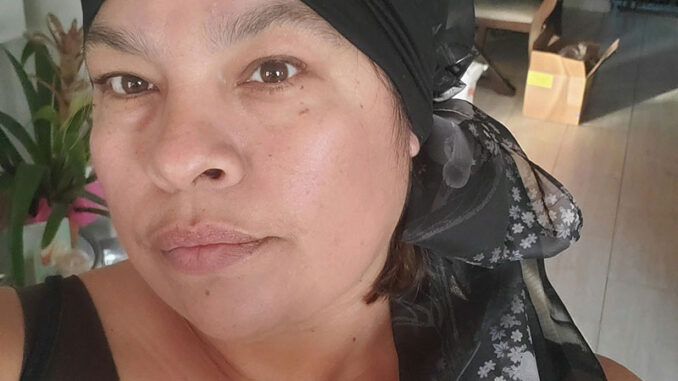
Story and Photos by Kristopher Beavers Data News Weekly Contributor
It was a regular night for Munissa Stephens at home in 2022. She was lying on the couch, relaxing after a long day at work, when she felt a lump as she reached for the TV remote. She didn’t think much of it and went about her night. The next day at work, she mentioned it to a coworker, who showed concern and urged her to see a doctor.
After several months of building courage, Stephens finally made an appointment. That same evening, the hospital called with results that would change her life forever. Stephens had been diagnosed with Stage 2 Breast Cancer.
“When the doctor’s office called me and told me what it was, I was devastated,” said Stephens, a Breast Cancer Survivor and patient resource worker. Three years later, Stephens is healthy and surrounded by family and friends who supported her through treatment.
“I’m a firm believer in Christ, and one thing to always remember is that God will never give you more than you can handle,” she said.
The Scope of the Disease
Breast Cancer still remains the most common form of cancer diagnosed across the United States. It can be a silent killer for both women and men due to its lack of early symptoms and detection. As of 2025, Breast Cancer rates continue to rise. About 1 in 8 women will be diagnosed with invasive Breast Cancer, and 1 in 43 cases will be fatal, according to the American Cancer Society.
The fatality rate among Black women is as highs 38-percent, higher than that of White women, though their overall incidence rate is about 5-percent lower. Experts attribute these differences to later-stage diagnoses, barriers to screening, and disparities in access to medical equipment.
“Younger Black women are more likely to be diagnosed with the most aggressive type of Breast Cancer, known as Triple-Negative Breast Cancer,” said Danielle M. Thompson, a Health Information Specialist in New Orleans. “Triple-Negative Breast Cancer was more common in young Black women (16.3-percent) than in young non-Black women (12.1-percent).”
Understanding the Disparities
The reasons behind higher mortality rates for Black women are complex and deeply tied to societal and health care inequities.
“Black women are often treated with less urgency in hospitals, lack access to appropriate medication, and have their pain dismissed,” wrote Priya Malhotra, a Researcher in Public Health with the Breast Cancer Research Foundation.
“The gap in Breast Cancer outcomes among Black women is complex and multifactorial. Social, economic, geographic, and lifestyle factors may partially account for disparities. Black women are statistically more likely to have diabetes, heart disease, and obesity,” Malhotra stated.
Preventive Measures
Early prevention and awareness remain the best tools against Breast Cancer. Eating nutritious meals, exercising regularly, and limiting alcohol or drug use can significantly lower risk and improve recovery outcomes.
“While I was going through treatment, I chose to be more careful about the food I bought for the house,” Stephens said. “I truly thank my family, especially my husband, for supporting me through it.”
Where to Find Support
For local residents, health professionals recommend a screening or test at local hospitals in the New Orleans area, such as Ochsner Health or LCMC Health. For community support, NOELA Community Health Center and Luke’s House Clinic also provide local assistance. Several nonprofit organizations also work to raise awareness and fund free screenings. Krewe de Pink supports Breast Cancer initiatives through community events, while the Louisiana Breast and Cervical Health Program offers free screenings for women across the state.
Every day, more women face the challenges of Breast Cancer, whether through personal battles or by supporting loved ones. Stephens said her journey helped her find purpose.
“When you go through these things, you have a testimony that can positively affect someone’s life,” she said.
Munissa Stephens is a breast cancer survivor and advocate for early detection.
Local organizations like Krewe de Pink collaborated with Pussyfooters to host breast cancer awareness events like Death by Chocolate NOT Breast Cancer this month spotlighting local chocolate and dessert makers in the city.
Recommended For You.



Be the first to comment